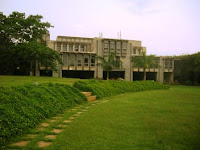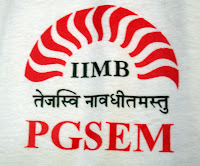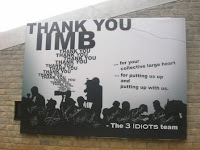IIM Bangalore along with Harvard
Business Publishing (HBP) and Boston Consulting Group (BCG) hosted a panel discussion titled “The $10 Trillion Prize:
Captivating the Newly Affluent in China and India” today
evening.
Panel Members included:
1.
Ms Vinita Bali, Chief Executive Officer, Britannia
Industries Ltd
2.
Mr Srivatsa Krishna, IAS
3.
Professor J
Ramachandran, IIM
Bangalore
4.
Mr Michael J. Silverstein, Senior partner and managing director
at The Boston Consulting Group
5.
Mr David Wan, Chief Executive Officer,
Harvard Business Publishing
The panel
discussion was moderated by Mr Abheek Singhi, Partner and Director at
The Boston Consulting Group.
The auditorium was full. The participants were welcomed on stage with thunderous applause.
Abheek presented a brief about the purpose of the book The $10 Trillion Prize on which the panel discussion was based on and some interesting tidbits about how unprecedented growth opportunities in India and China have changed the life expectancy, disposable income and hope, aspiration, dreams and energy of its people.
After that presentation, the panel discussion was opened with 3 questions. 1) Are there any reasons to be bullish/bearish in these markets and what are the risks involved 2) What does it take to win in China and India. 3) If you look at the government and societies in these countries, what either of them have to do in order to improve the hurdles?
Ms. Bali first spoke about the market and that given the high level of consumption due to population, there is no question that the opportunities are huge and that for huge markets like India and China, at every price point there is a large base of consumers. Be it a Re 3/5 packet of biscuits or BMW/Audi/Mercedes, there is a large consumer base. Hence the absolute numbers add up and make the businesses worthwhile.
Mr. Srivatsa started with a humourous anecdote and went on to talk about entrepreneurship in India and about the opportunities in both countries.
Mr. Silverstein talked about the 'paisa vasool' and the exuberant experience of a consumer when they get a product at a great price point.
Prof. J Ram talked about education and the part it plays in shaping up a nation. Also that the level of importance given by parents in investing their money in education with the hope that the children will have better future. But the challenge is tht there are millions to reach out to. Elitist education is not enough.
Mr David Wan said that the demand is so high that few institutions can not fulfill the requirements of high quality education. And that the HBR blogs and forums get 30% traffic from India where the commentaries are of the highest quality.
After opening comments by each participant, the discussion focused about 2-3 specific topics:
1) Education: What is the way forward for India? Prof. J Ram pointed out that we have a policy issue and that we are focused towards elitist education. IITs, IIMs are not enough. We need faculty coupled with knowledge, hence our PhD programs should be strengthened. Our primary schooling system is broken and it has to be rectified. Only then as a nation, we can be ready for the future.
Mr Silverstein said that India is seriously disadvantaged in terms of education. India is under funded. He specifically said "YOU TOLERATE. You tolerate that 70% of your schools are sub-standard."
China on the other hand directs graduates to study what it wants them to study and it is a global competitor as a category killer.
2) Entrepreneurship: What prevents India from being entrepreneurial? Both Vinita and Srivatsa had the opinion that India doesn't have the ecosystem for the entrepreneurs to flourish and is not conducive. For being entrepreneurial, one needs some beliefs and attitude which is missing. Here even those who are entrepreneurs are only to meet daily requirements. And one doesn't drive at excellence here and we encounter "CORRUPTION" every step of the way which is a huge deterrent to growth.
Prof J Ram mentioned that an ambition of different order is required to scale entrepreneurial heights and one thinks about the cost of NOT doing while starting a venture here.
Also significant points were that we should strive for excellence. We Indians tolerate nonsense. And that kind of permeates into accepting less than the best. We must showcase more and unleash the energy (like Olympic athletes strive for excellence). Our education system should be invested in and we should be unwilling to accept less.
Mr Silverstein concluded that the next decade is for India and China. Both must put in the resources and provide access to capital for the nation to grow and the most critical resource for the next decade would be 'water' and that we should strive to improve water access, power, and other natural resources. Corruption costs India and China 2GDP points per year and hence the governance should be put in order and corruption must be reigned in.
Key takeaways:
1) No questions that the opportunity is huge in India and China
2) In India, policy issues must be tackled. Primary and PhD education system must be strengthened.
3) Corruption eats up 2 GDP points every year. Must be handled.
4) An ecosystem conducive to entrepreneurship must be encouraged
5) India must invest in agriculture; in seeds, technology, machinery. It will free up 100 million hands to do some other productive work.
6) We must strive for excellence. "Chalta hai" attitude won't do. We must not accept anything less than the best.
7) Key question: Will India fix its governance first or China fix its politics first?








